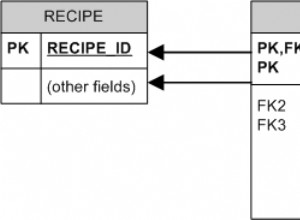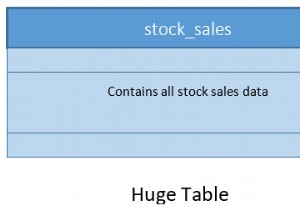Kết thúc việc lăn lộn của riêng tôi. Cũng nhận ra rằng INTEGER 126 bit của Oracle không đủ bit cho các địa chỉ 128 bit của IPv6. Thành thật mà nói, tôi không biết INET6_ATON (hoặc INET_PTON) của thư viện C ban đầu thực hiện nó như thế nào, vì tôi chưa bao giờ nghe nói về số nguyên 16 byte.
Tôi đã kết thúc với một chuỗi hex 32 byte, có nghĩa là tôi phải thực hiện một số phép toán "nửa chuỗi" ưa thích trên nettohex và sử dụng SUBSTR để FBI hoạt động chính xác. (PL / SQL bị thổi phồng không cho phép "RETURN CHAR (32)" ...)
Mặc dù vậy, về tổng thể, nó hoạt động tốt, hoạt động ở mọi định dạng và cho phép so sánh ký tự dựa trên chỉ mục để tìm xem địa chỉ IP có nằm trong dải IP hay không.
Đây là mã đầy đủ:
CREATE OR REPLACE FUNCTION ipguess(
ip_string IN VARCHAR2
) RETURN NATURAL
DETERMINISTIC
IS
BEGIN
-- Short-circuit the most popular, and also catch the special case of IPv4 addresses in IPv6
IF REGEXP_LIKE(ip_string, '\d{1,3}(\.\d{1,3}){3}') THEN RETURN 4;
ELSIF REGEXP_LIKE(ip_string, '[[:xdigit:]]{0,4}(\:[[:xdigit:]]{0,4}){0,7}') THEN RETURN 6;
ELSE RETURN NULL;
END IF;
END ipguess;
CREATE OR REPLACE FUNCTION iptohex(
ip_string IN VARCHAR2
) RETURN CHAR -- INTEGER only holds 126 binary digits, IPv6 has 128
DETERMINISTIC
IS
iptype NATURAL := ipguess(ip_string);
ip VARCHAR2(32);
ipwork VARCHAR2(64);
d INTEGER;
q VARCHAR2(3);
BEGIN
IF iptype = 4 THEN
-- Sanity check
ipwork := REGEXP_SUBSTR(ip_string, '\d{1,3}(\.\d{1,3}){3}');
IF ipwork IS NULL THEN RETURN NULL; END IF;
-- Starting prefix
-- NOTE: 2^48 - 2^32 = 281470681743360 = ::ffff:0.0.0.0
-- (for compatibility with IPv4 addresses in IPv6)
ip := '00000000000000000000ffff';
-- Parse the input
WHILE LENGTH(ipwork) IS NOT NULL
LOOP
d := INSTR(ipwork, '.'); -- find the dot
IF d > 0 THEN -- isolate the decimal octet
q := SUBSTR(ipwork, 1, d - 1);
ipwork := SUBSTR(ipwork, d + 1);
ELSE
q := ipwork;
ipwork := '';
END IF;
-- convert to a hex string
ip := ip || TO_CHAR(TO_NUMBER(q), 'FM0x');
END LOOP;
ELSIF iptype = 6 THEN
-- Short-circuit "::" = 0
IF ip_string = '::' THEN RETURN LPAD('0', 32, '0'); END IF;
-- Sanity check
ipwork := REGEXP_SUBSTR(ip_string, '[[:xdigit:]]{0,4}(\:[[:xdigit:]]{0,4}){0,7}');
IF ipwork IS NULL THEN RETURN NULL; END IF;
-- Replace leading zeros
-- (add a bunch to all of the pairs, then remove only the required ones)
ipwork := REGEXP_REPLACE(ipwork, '(^|\:)([[:xdigit:]]{1,4})', '\1000\2');
ipwork := REGEXP_REPLACE(ipwork, '(^|\:)0+([[:xdigit:]]{4})', '\1\2');
-- Groups of zeroes
-- (total length should be 32+Z, so the gap would be the zeroes)
ipwork := REPLACE(ipwork, '::', 'Z');
ipwork := REPLACE(ipwork, ':');
ipwork := REPLACE(ipwork, 'Z', LPAD('0', 33 - LENGTH(ipwork), '0'));
ip := LOWER(ipwork);
ELSE
RETURN NULL;
END IF;
RETURN ip;
END iptohex;
CREATE OR REPLACE FUNCTION nettohex(
ip_string IN VARCHAR2,
cidr IN NATURALN,
is_end IN SIGNTYPE DEFAULT 0
) RETURN CHAR
DETERMINISTIC
IS
iptype NATURAL := ipguess(ip_string);
iphex CHAR(32) := iptohex(ip_string);
iphalf1 CHAR(16) := SUBSTR(iphex, 1, 16);
iphalf2 CHAR(16) := SUBSTR(iphex, 17);
ipwork CHAR(16) := iphalf2;
cidr_exp INTEGER := 2 ** (iptype + 1) - cidr;
ipint INTEGER;
subnet INTEGER;
is_big SIGNTYPE := 0;
BEGIN
-- Sanity checks
IF iptype IS NULL THEN RETURN NULL;
ELSIF iphex IS NULL THEN RETURN NULL;
END IF;
IF cidr_exp >= 64 THEN is_big := 1;
ELSIF cidr_exp = 0 THEN RETURN iphex; -- the exact IP, such as /32 on IPv4
ELSIF cidr_exp < 0 THEN RETURN NULL;
ELSIF cidr_exp > 128 THEN RETURN NULL;
END IF;
-- Change some variables around if we are working with the first/largest half
IF is_big = 1 THEN
ipwork := iphalf1;
iphalf2 := TO_CHAR((2 ** 64 - 1) * is_end, 'FM0xxxxxxxxxxxxxxx'); -- either all 0 or all F
cidr_exp := cidr_exp - 64;
END IF;
-- Normalize IP to divisions of CIDR
subnet := 2 ** cidr_exp;
ipint := TO_NUMBER(ipwork, 'FM0xxxxxxxxxxxxxxx');
-- if is_end = 1 then add one net range (then subtract one IP) to get the ending range
ipwork := TO_CHAR(FLOOR(ipint / subnet + is_end) * subnet - is_end, 'FM0xxxxxxxxxxxxxxx');
-- Re-integrate
IF is_big = 0 THEN iphalf2 := ipwork;
ELSE iphalf1 := ipwork;
END IF;
RETURN SUBSTR(iphalf1 || iphalf2, 1, 32);
END nettohex;
-- WHERE clause:
-- 1. BETWEEN compare:
-- iptohex(a.ip_addy) BETWEEN nettohex(b.net_addy, b.cidr, 0) AND nettohex(b.net_addy, b.cidr, 1)
--
-- Requires three function-based indexes, but all of them would work, as they are all inside the tables.
--
-- 2. CIDR match:
-- nettohex(a.ip_addy, b.cidr) = nettohex(b.net_addy, b.cidr)
--
-- Only two functions and uses exact match, but first one requires an outside variable. Last one would be only function-based index.
-- An FBI of iptohex(a.ip_addy) could be implemented, but it's questionable if nettohex would use that index.
--
-- Recommended FBIs:
--
-- (SUBSTR(iptohex(a.ip_addy), 1, 32))
-- (SUBSTR(nettohex(b.ip_addy, b.cidr, 0), 1, 32), SUBSTR(nettohex(b.ip_addy, b.cidr, 1), 1, 32))
--
-- NOTE: Will need to use the SUBSTR form for the above WHERE clauses!
CẬP NHẬT: Oracle 11g không cho phép mục nhập SUBSTR được đặt một cột ảo. Vì vậy, bạn có thể có các cột như sau:
ip VARCHAR2(39),
cidr NUMBER(2),
ip_hex AS (SUBSTR(iptohex(ip), 1, 32)) VIRTUAL,
ip_nethex_start AS (SUBSTR(nettohex(ip, cidr, 0), 1, 32)) VIRTUAL,
ip_nethex_end AS (SUBSTR(nettohex(ip, cidr, 1), 1, 32)) VIRTUAL,
Và các chỉ mục như:
CREATE INDEX foobar_iphex_idx ON foobar (ip_hex);
CREATE INDEX foobar_ipnet_idx ON foobar (ip_nethex_start, ip_nethex_end);
Sử dụng mệnh đề WHERE như:
a.ip_hex BETWEEN b.ip_nethex_start AND b.ip_nethex_end
nettohex(a.ip, b.cidr) = b.ip_nethex_start -- not as effective




